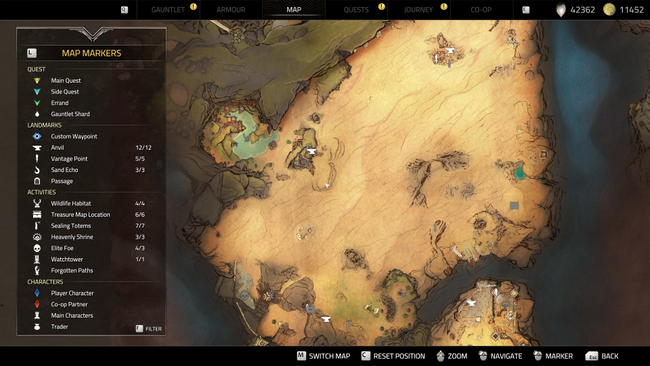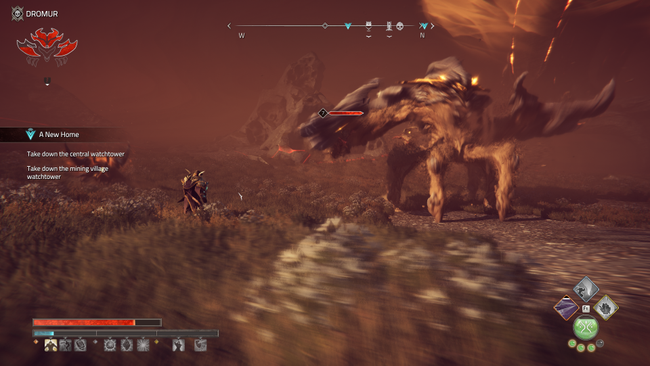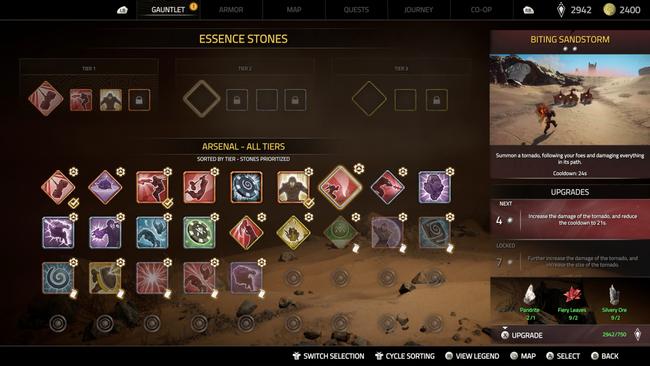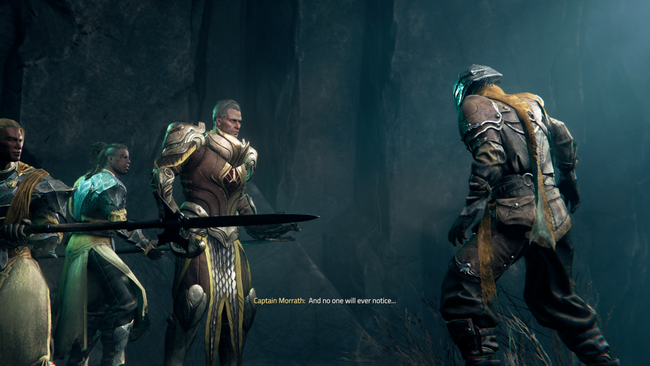Atlas Fallen Review
In the last decade or so, the German development team at Deck13 is primarily known for a handful of Soulslike action RPGs, starting with the original Lords of the Fallen in 2014, followed by two The Surge entries. The studio's newest project is Atlas Fallen, which abandons any major Souls influence and is instead a more traditional open-world action RPG. I was moderately pleased with The Surge and its sequel, so I was interested in seeing Deck13's take on a different flavor of the genre.
However, Atlas Fallen does not make a good first impression, at all. The opening sections of the game are, plainly put, crummy. After a quick combat tutorial, you are suddenly dropped into a desert caravan as an unnamed slave, apparently during a sandstorm of sorts. Not only is the overall aesthetic to this section of the game tedious with a lot of murky visual noise (think like 'cloudy dusk whirling sand everywhere'), but the introduction to your character and predicament feels narratively disjointed. The pace of tutorials feels also too extended, and the game locks off a lot of game systems for an extended period of time before you *actually* get to the real game about an hour later. You don't have a map, and you can't even save during this portion. It's very clunky and honestly a terrible vertical slice of the game.
Luckily, once you pass through this crummy opening, things begin to make more sense.

The basic premise of the game is this. Your custom character is an unnamed slave who stumbles across a magic gauntlet that effectively shape-shifts into ethereal weapons. You set out into the world to learn more about the mysterious voice behind the gauntlet, as well as to stop an oppressive monarch and tyrannical god.
Atlas Fallen is an open-world type RPG, but not so huge to be unwieldy (and yes you eventually get a map). The explorable zones you visit are not overwhelmingly mammoth-sized and each of the game's four major zones only takes a few hours to explore fully. In fact, Atlas Fallen is a relatively short experience overall, beatable in 10-15 hours with 100% completion doable in about 25 hours. When so many RPGs today easily push past 50-60+ hour endeavors, I'll readily welcome a more bite-sized RPG any day.
As far as the open-world design goes, it's entertaining in the way these sorts of games typically are. Outside of the main questline, there are several mini-events to encounter in the world — various puzzles leading to chests or lore with each numbered as a sort of checklist on the map — alongside more involved characters and sidequests to discover. Since these zones are manageable in size, completing these various mini-objectives and quests isn't at all overwhelming and doesn't feel like a chore. Much of this exploration is still optional, of course, and you can just beeline the main narrative if you want to.
The map itself is relatively dense compared to other recent open-world RPGs (compared to, say, Forspoken) with a notable amount of verticality built into the world design. I appreciate this on its face, but I do wish the game gave be a higher vertical jump to more easily navigate through these locations rather than rely on somewhat finicky platforming to gain height in certain areas.

Atlas Fallen's most unique and defining gameplay mechanic is the Momentum Gauge, which is the blue meter that sits below your health bar in the corner of the screen. When you encounter enemies, this bar begins empty and slowly fills up as you land attacks on your foes. As the bar fills up, it'll pass various nodes on the bar that will unlock both passive and active abilities in that fight. The amount of damage you will do also increases as the meter fills, with your shape-shifting weapons even growing in size.
As you might expect, that means every battle in the game starts out with relatively basic combo attacks, and you'll get progressively stronger with more complex abilities as a combat encounter drags on. The longer the battle, the stronger you'll become. You can kind of think of this Momentum Gauge like hitting the gas pedal in your car; you start at rest but will steadily climb to fast speeds, changing gears along the way.
The game's main character-building mechanic is also tied to the Momentum Gauge. The nodes you set on the gauge are up to you, for both passive and active abilities. For example, in my playthrough of the game, I had one of the first nodes on the meter simply set as a passive damage increase, meaning I would hit the node early on in every battle (to continue my car analogy, imagine getting a strength boost once you reached 10 MPH during your acceleration). Later on the meter, I set nodes for obtaining better loot (say, 30 MPH), and at the end of the meter, I had nodes that activated automatic parrying (say, 60 MPH). There are some restrictions on which abilities can be placed on which nodes, but ultimately this is how you tailor your character to your playstyle.
Once you get up to speed, combat becomes quite energetic and varied, and this component is easily Atlas Fallen's biggest strength.

This momentum system is genuinely pretty cool and novel, both allowing for a significant amount of flexibility in character builds while also keeping combat feeling engaging in each battle. There is a little bit of a 'ramp up' to each encounter before you get to full throttle, but I think the game does a pretty good job never making it feel like the Momentum Gauge takes too long for things to get up to speed.
However, combat design is a bit more tedious in other ways. In general in games like this, one of my least favorite battle gimmicks is when a big boss monster summons little underlings to annoy you while you are fighting, and boy Atlas Fallen just happens to love this sort of battle design. Practically every medium-to-big size monster in the game will periodically summon a group of mooks to join the battle — you'll see this constantly throughout the course of the game.
There is a reason for this, which more-or-less boils down to how the Momentum Gauge fills faster when you are able to hit multiple enemies at once. It seems, to me, that momentum against singular bigger foes doesn't work out as well mechanically as it does against groups of 4-5 small enemies, so the game uses this sort of underling-summoning design as a crutch to acquiesce to the game's underlying mechanical philosophy and keeping momentum going. Regardless, this end result is somewhat exhausting, and I really wish they approached handling combat against larger enemies in some other way.
Atlas Fallen doesn't use experience points typical to the genre, but it effectively works out similarly regardless. Rather than getting experience to level up to improve your stats, you'll gain materials to improve your armor, which will in turn give you new stats and perks.

Atlas Fallen's narrative elements are unfortunately one of the game's weaker components. There are a few potentially interesting ideas conceptually involving a few characters, and I actually greatly appreciate the diversity of characters you encounter in the game. However, the actual outward narrative & conflict is very done-before without any interesting wrinkles, and it leaves no lasting impression. The game's visual presentation also feels a bit dated when it comes to character models and dialogue, which admittedly takes a little bit of getting used to.
There's simply nothing to latch onto here, either in superficial or more meaningful ways. If you primarily play RPGs for their story elements, Atlas Fallen is probably not the game you are looking for. This is perhaps not too surprising, given how narratively lean both The Surge titles are, but I still can't help but feel the effort here missed the mark.
One significant additional consideration to Atlas Fallen is that the game is fully playable in cooperative multiplayer with one other person. As is the case with many co-op games, things get a bit tricky if two players are trying to play together when they have individually made significantly different progress in the story, as progression is sometimes locked off in co-op. However, if you wanted to play Atlas Fallen with a friend, you can do so, and I would suggest playing the game in lockstep to avoid mismatched story progression affecting co-op sessions.
While playing in co-op, each player is basically free to explore the map on their own, fighting enemies, completing quests, looting chests (which is shared), solving puzzles, and the like. So, if you were looking for a relatively short action RPG experience to play with a friend, Atlas Fallen is worth a shot. Even if Atlas Fallen is only a so-so title in single-player, playing with a friend can always make any experience that much more enjoyable.
Atlas Fallen is an average action RPG with some interesting Momentum combat mechanics, a respectable open-world design, subpar presentation, and a disappointing narrative. In some ways, it feels like a step down from The Surge titles, and I'll always look forward to what Deck13 works on next, but Atlas Fallen didn't land as strongly for me as I hoped it would.